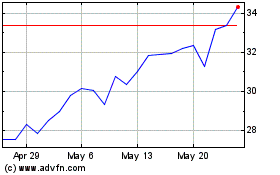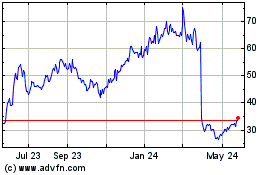Disc Medicine, Inc. (NASDAQ:IRON), a clinical-stage
biopharmaceutical company focused on the discovery, development,
and commercialization of novel treatments for patients suffering
from serious hematologic diseases, today announced positive
feedback from its Type C meeting with the U.S. Food and Drug
Administration (FDA) to discuss the APOLLO post-marketing
confirmatory trial for bitopertin in EPP.
“Our recent FDA interaction marks another step toward delivering
a potentially life-altering therapy for EPP patients, and we
appreciate the collaboration with regulators, our investigators,
and the EPP patient community which has brought us to this point,”
said John Quisel, J.D., Ph.D., President and Chief Executive
Officer of Disc. “Last year, we aligned with the FDA on PPIX
reduction as a surrogate endpoint for potential accelerated
approval of bitopertin, and we are actively pursuing that path with
plans to submit an NDA in the second half of 2025. As part of that
process, the Type C meeting has provided further clarity on our
plans for the APOLLO post-marketing confirmatory trial, which will
kick off by the middle of this year and could eventually be the
basis for converting an accelerated approval, if granted, to a full
approval.”
The meeting resulted in alignment on the design of the APOLLO
post-marketing confirmatory trial. Key features include:
- Co-primary endpoints of average monthly total time in sunlight
without pain between 10:00 and 18:00 during the last month of the
6-month treatment period and percent change from baseline in whole
blood metal-free PPIX after 6 months of treatment;
- Other measures of efficacy such as occurrence of phototoxic
reactions, cumulative total pain-free time in sunlight, patient
global impression of change (PGIC), and time to prodrome;
- Selection of 60 mg dose of bitopertin and 6-month treatment
duration;
- Inclusion of patients aged 12+ with EPP including X-linked
protoporphyria (XLP); and
- Double-blind, placebo-controlled study with ~150 patients
randomized 1:1.
Disc plans to initiate the APOLLO trial by mid-2025 and will
include sites in the US, Canada, Europe, and Australia. Based on
guidance toward an NDA submission in H2 2025, Disc expects
enrollment of the APOLLO trial to be well underway by the time of
an accelerated approval, if granted.
Management will host a call to discuss these updates on Tuesday,
January 21 at 8:00 am EST. Please register for the event on
the Events and Presentations page of Disc’s website
(https://ir.discmedicine.com/).
About Bitopertin
Bitopertin is an investigational, clinical-stage, orally
administered inhibitor of glycine transporter 1 (GlyT1) that is
designed to modulate heme biosynthesis. GlyT1 is a membrane
transporter expressed on developing red blood cells and is required
to supply sufficient glycine for heme biosynthesis and support
erythropoiesis. Disc is planning to develop bitopertin as a
potential treatment for a range of hematologic diseases including
erythropoietic porphyrias, where it has potential to be the first
disease-modifying therapy. Bitopertin has been studied in multiple
clinical trials in patients with EPP, including the Phase 2
open-label BEACON trial, the Phase 2 double-blind,
placebo-controlled AURORA trial, and an open-label extension HELIOS
trial.
Bitopertin is an investigational agent and is not approved for
use as a therapy in any jurisdiction worldwide. Disc obtained
global rights to bitopertin under a license agreement from Roche in
May 2021.
About Erythropoietic Protoporphyria (EPP)
Erythropoietic protoporphyria (EPP), including X-linked
Protoporphyria (XLP), is a rare, debilitating and potentially
life-threatening disease caused by mutations that affect heme
biosynthesis, resulting in the accumulation of a toxic, photoactive
intermediate called protoporphyrin IX (PPIX). This causes severe
reactions when patients are exposed to sunlight, characterized by
excruciating pain, edema, burning sensations and potential
blistering and disfigurement. PPIX also accumulates in the
hepatobiliary system and can result in complications including
gallstones, cholestasis, and liver damage in 20-30% of patients and
in extreme cases liver failure. Current standard of care involves
extreme measures to avoid sunlight, including restricting outdoor
activities to nighttime, use of protective clothing and opaque
shields, and pain management. This has a significant impact on the
psychosocial development, quality of life, and daily activities of
patients, particularly in young children and families. There is
currently no cure for EPP and only one FDA-approved therapy, a
surgically implanted synthetic hormone designed to stimulate
melanin production called Scenesse® (afamelanotide).
About Disc Medicine
Disc Medicine is a clinical-stage biopharmaceutical company
committed to discovering, developing, and commercializing novel
treatments for patients who suffer from serious hematologic
diseases. We are building a portfolio of innovative, potentially
first-in-class therapeutic candidates that aim to address a wide
spectrum of hematologic diseases by targeting fundamental
biological pathways of red blood cell biology, specifically heme
biosynthesis and iron homeostasis. For more information, please
visit www.discmedicine.com.
Disc Cautionary Statement Regarding Forward-Looking
Statements
This press release contains “forward-looking statements” within
the meaning of the Private Securities Litigation Reform Act of
1995, including, but not limited to, express or implied statements
regarding Disc’s expectations with respect to its potential APOLLO
confirmatory clinical study of bitopertin in EPP and XLP patients,
including the proposed study design, the anticipated timeline, and
the results thereof; and the possible regulatory path forward for
bitopertin in EPP, including whether the FDA will determine that
the accelerated approval pathway continues to be appropriate, the
treatment of the APOLLO clinical study as a post-marketing
confirmatory trial, and the timeline for a potential NDA submission
and accelerated approval, if granted, and whether the NDA
submission will meet the standards of accelerated approval. The use
of words such as, but not limited to, “believe,” “expect,”
“estimate,” “project,” “intend,” “future,” “potential,” “continue,”
“may,” “might,” “plan,” “will,” “should,” “seek,” “anticipate,” or
“could” or the negative of these terms and other similar words or
expressions that are intended to identify forward-looking
statements. Forward-looking statements are neither historical facts
nor assurances of future performance. Instead, they are based on
Disc’s current beliefs, expectations and assumptions regarding the
future of Disc’s business, future plans and strategies, clinical
results and other future conditions. New risks and uncertainties
may emerge from time to time, and it is not possible to predict all
risks and uncertainties. No representations or warranties
(expressed or implied) are made about the accuracy of any such
forward-looking statements.
Disc may not actually achieve the plans, intentions or
expectations disclosed in these forward-looking statements, and
investors should not place undue reliance on these forward-looking
statements. Actual results or events could differ materially from
the plans, intentions and expectations disclosed in the
forward-looking statements as a result of a number of material
risks and uncertainties including but not limited to: the adequacy
of Disc’s capital to support its future operations and its ability
to successfully initiate and complete clinical trials; the nature,
strategy and focus of Disc; the difficulty in predicting the time
and cost of development of Disc’s product candidates; Disc’s plans
to research, develop and commercialize its current and future
product candidates; the timing of initiation of Disc’s planned
preclinical studies and clinical trials; the timing of the
availability of data from Disc’s clinical trials; Disc’s ability to
identify additional product candidates with significant commercial
potential and to expand its pipeline in hematological diseases; the
timing and anticipated results of Disc’s preclinical studies and
clinical trials and the risk that the results of Disc’s preclinical
studies and clinical trials may not be predictive of future results
in connection with future studies or clinical trials and may not
support further development and marketing approval; and the other
risks and uncertainties described in Disc’s filings with the
Securities and Exchange Commission, including in the “Risk Factors”
section of its Annual Report on Form 10-K for the year ended
December 31, 2023, and in its Quarterly Report on Form 10-Q for the
quarterly period ended September 30, 2024. Any forward-looking
statement speaks only as of the date on which it was made. None of
Disc, nor its affiliates, advisors or representatives, undertake
any obligation to publicly update or revise any forward-looking
statement, whether as result of new information, future events or
otherwise, except as required by law.
Media Contact
Peg RusconiDeerfield Grouppeg.rusconi@deerfieldgroup.com
Investor Relations Contact
Christina TartagliaPrecision
AQchristina.tartaglia@precisionaq.com
Disc Medicine (NASDAQ:IRON)
Historical Stock Chart
From Dec 2024 to Jan 2025

Disc Medicine (NASDAQ:IRON)
Historical Stock Chart
From Jan 2024 to Jan 2025
